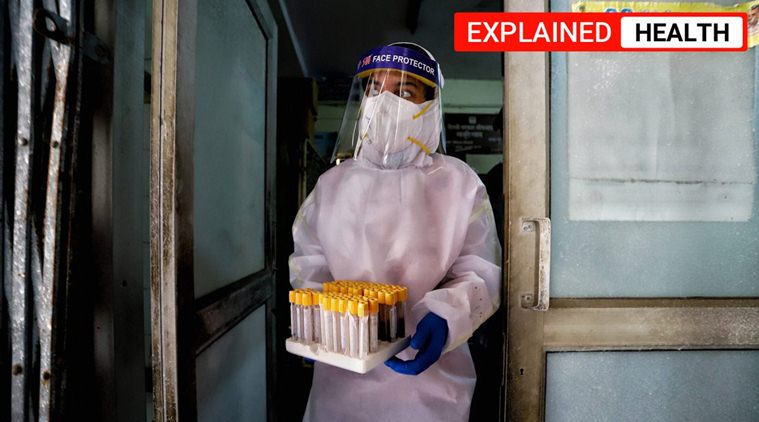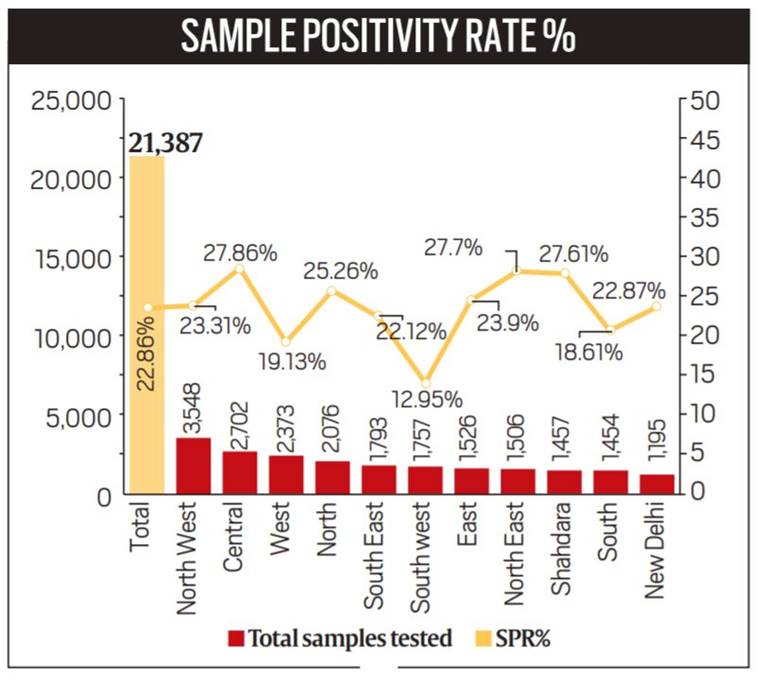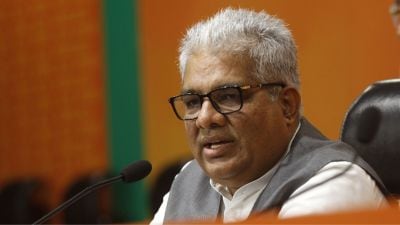Explained: Here are the key takeaways from Delhi’s serological survey
The presence of IgG antibodies indicates that a person has been exposed to the virus that causes Covid-19. The test is sensitive and specific, and provides an estimate of the spread of the SARS-CoV-2 infection in the population.
 A health worker collects blood samples for serological survey to analyse the spread of Covid-19, at Khajuri Khas in New Delhi. (PTI Photo)
A health worker collects blood samples for serological survey to analyse the spread of Covid-19, at Khajuri Khas in New Delhi. (PTI Photo)
The Ministry of Health and Family Welfare on Tuesday declared the results of a serological survey carried out in Delhi between June 27 and July 10, which showed that 22.86% of the people surveyed had developed IgG antibodies, indicating they had been exposed to the novel coronavirus that causes Covid-19.
A total 21,387 samples were collected to look for the presence of antibodies. The study has found that a large number of infected persons remain asymptomatic.
What is a serological survey?
A serological survey seeks to assess the prevalence of disease in a population by detecting the presence of specific antibodies against the virus. A serological test is performed to diagnose infections and autoimmune illnesses. It can also be conducted to check if a person has developed immunity to certain diseases.
The survey included the IgG Enzyme-Linked Immunosorbent Assay (ELISA) test which estimates the proportion of the population exposed to SARS-CoV-2 infection. The IgG test is not useful for detecting acute infections, but it indicates episodes of infections that may have occurred in the past. The test has been approved by ICMR for its high sensitivity and specificity.
A serological survey is done to detect the presence of specific antibodies, and is used to assess the prevalence of a disease in the population. The test indicates past infections (and which triggered an immune response), and is not used to detect active infections.
What does the survey carried out in Delhi show?
The seroprevalence study found the presence of antibodies in 22.86 per cent of the people surveyed. This rate of seropositivity cannot, however, be extrapolated over Delhi’s entire population – as of Tuesday evening, the number of confirmed cases, including both active and cured/discharged/migrated cases, stood at only 1,23,747 on the Health Ministry’s website. Since it is not possible to test everyone in the population, serological studies are used as a tool to make an estimate of the extent of disease spread in the community.
At a press conference on Tuesday, the Health Ministry said that the fact that only 22.86% were found to be infected in a survey carried out in a city with several pockets of dense population, shows that the proactive efforts by the government to prevent the spread of Covid-19, including prompt lockdown, effective containment and surveillance measures, contact tracing and tracking, as well as citizens’ compliance had yielded benefits.
Also read | Delhi: At 28%, Covid prevalence highest in Central district
Has such a survey been carried out in other states as well?
In April, the Indian Council of Medical Research (ICMR) had conducted a pilot serosurvey in 83 districts in 21 states. The initial results, which are being peer-reviewed, indicate that the percentage of the general population that could have been infected in the past was 0.73 per cent, with urban areas showing a higher prevalence of 1.09 per cent.
ICMR has said it would soon launch a follow-up serosurvey across the country.
 Sample positivity rate %
Sample positivity rate %
How was the exercise in Delhi carried out?
About 160 four-member teams — each comprising an Anganwadi/ASHA worker, an auxiliary nurse midwife (ANM), a pharmacist, and a phlebotomist (someone who is trained to draw blood for testing) visited homes that were randomly picked by district administrations.
📣 Express Explained is now on Telegram. Click here to join our channel (@ieexplained) and stay updated with the latest
The blood samples were collected from selected individuals after taking their written, informed consent, and their sera were then tested for IgG antibodies and infection using the ICMR-approved COVID KAVACH ELISA kit. The blood samples were tested for IgG antibodies.
So what happens now?
The government has said that results show that a significant proportion of the population is still vulnerable to contracting the novel coronavirus infection. “Containment measures need to continue with the same rigour. Non-pharmacological interventions such as physical distancing, use of face mask/cover, hand hygiene, cough etiquette and avoidance of crowded places etc. must be followed strictly,” it has said.
- 01
- 02
- 03
- 04
- 05






































